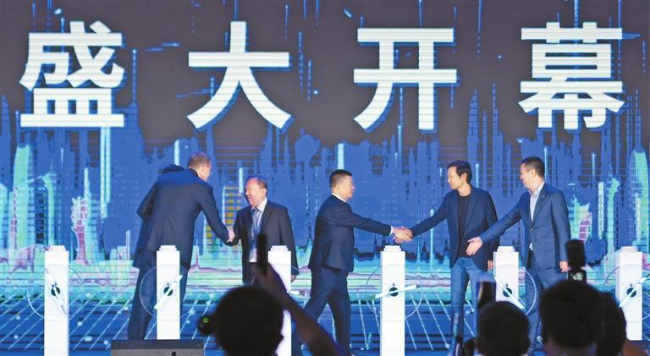Innovation highlighted at GBA auto show forum
2024-06-03

Lei Jun (2nd R), chairman and CEO of Xiaomi, Li Bin (R), NIO’s chairman and CEO, and other heavyweights of China’s new energy vehicle industry shake hands with each other while attending a forum at the ongoing Guangdong-Hong Kong-Macao Greater Bay Area International Auto Show in Bao’an District on Saturday. Liu Xudong
LEI JUN, chairman and CEO of Xiaomi, was greeted like a rock star by tens of thousands of devoted fans Saturday as he took to the stage at an auto show forum at the Shenzhen World Exhibition & Convention Center in Bao’an District. The Guangdong-Hong Kong-Macao Greater Bay Area (GBA) International Auto Show began Saturday and will run through June 9. Lei said he felt at home in Shenzhen, a city renowned for its vibrancy and innovation. The tech icon expressed his affinity for the city’s innovative spirit, saying, “The image and approach of Xiaomi resonate particularly well with the characteristics of Shenzhen.” His words were echoed by other top figures who attended the auto show’s opening ceremony and the forum for pioneers in China’s new energy vehicle (NEV) industry. Tech innovation NIO’s chairman and CEO Li Bin (William Li) emphasized that the rise of smart electric vehicles has once again thrown the automotive arena into the forefront of technological advancement during his speech at the forum. Reflecting on NIO’s inception in 2014, Li underscored the centrality of self-developed technological innovation within their corporate ethos. “Technology is the true essence of NIO,” he said. Oliver Locher, senior executive vice president at Mercedes-Benz China Investment, highlighted the role of China’s innovative speed in driving his company towards advancements. “I am sitting with Lei Jun, William Li, and Huawei’s Yu Chengdong. I must say, I have deep respect for the Chinese automobile industry. I see they are boosting innovation. I love it because they are also inspiring us,” Locher told the audiences. China is Mercedes-Benz’s largest single market and biggest production site. Locher emphasized the fusion of Mercedes-Benz’s innovation with the rapid pace set by Chinese partners. “China is leading the future of global automotive trends. That’s why our China network is accelerating progress in AI— the car’s interaction with the user and the environment,” Locher said. “We believe the industry transformation will not be a straight line. It’s not happening overnight and market conditions and customer needs will define the pace of the transformation. Industry transformation is like a marathon and we are well prepared for the long run,” he said. New forces The commitment to innovation was underscored by Xiaomi’s ambitious plans for expansion and delivery speed. “Xiaomi will deliver at least 100,000 cars this year, aiming for 120,000,” Lei said. In just two months since the launch of Xiaomi’s new Speed Ultra 7 (SU7) sedan, the firm has delivered more than 15,000 units, according to Lei. “Delivering 120,000 cars of a single model within nine months could be a milestone — a record in the industry,” he said. Reflecting on Xiaomi’s journey into the auto sector, Lei emphasized a strategy grounded in significant investment, a meticulous focus on a single car model, and a relentless pursuit of core technological advancements. Explaining the rapid progress achieved over three years, Lei pointed to the growing significance of intelligence in the sector. Smart cockpits, intelligent driving systems, voice-controlled functionalities, integrated ecosystems, and intricate electronic architectures are shaping the future of cars, he said. Lei asserted that Xiaomi’s expertise in consumer electronics over 14 years positions it at the forefront of developing smart electric vehicles. Meanwhile, NIO’s Li stressed his company’s investment in research and development. Since 2015, NIO has been on a global quest for top talent and established research and development teams in over 10 cities across six countries. “People often ask why our company cannot make profit now and where the money has gone. In 2022, our research and development investment was 10.8 billion yuan (US$1.49 billion), while last year it was 13.4 billion yuan,” Li said. With a global workforce exceeding 11,000 individuals, NIO’s impact reverberates across borders — the company has filed 8,700 patents worldwide. The company also boasts 3,776 self-owned charging stations and an impressive 21,995 chargers worldwide, Li said. Yu Chengdong, Huawei’s executive director and chairman of the board of directors of the Consumer BG, shared impressive sales figures of smart cars co-developed by his company that have solidified its position as the top-selling newcomer in China. “Huawei’s AITO M7 Ultra SUV is the ultimate SUV choice for Chinese families,” he announced. Yu highlighted Huawei’s technological prowess but acknowledged that there is room for improvement in design and aesthetic details. “We can learn from Lei Jun’s focus on user-friendly features like sun protection and storage for female users,” Yu said. The most eye-catching moment at the auto show was the interaction between Yu and Zhou Hongyi, founder and chairman of 360 Security Technology, at the Huawei booth. Yu presented an AITO M9 to Zhou, who had previously auctioned his Maybach S600 on Douyin live and bought the Huawei NEV. Zhou said he wants to foster greater confidence in the Chinese NEV industry by experiencing high-end domestic NEVs. (Shenzhen Daily)
